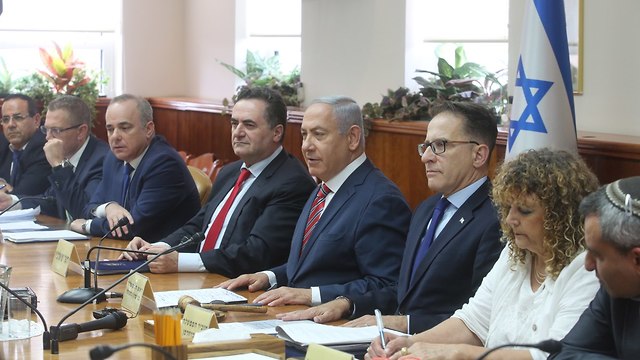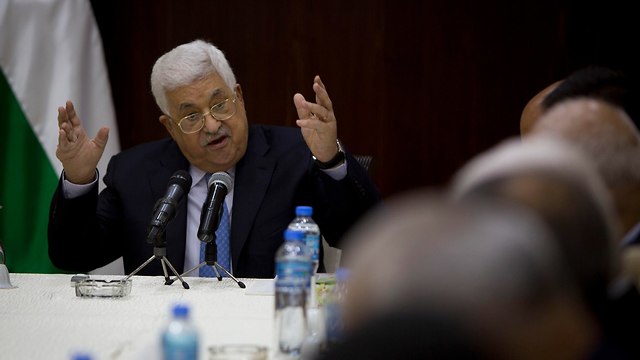
Instead of preparing for post-Abbas era, Israel is kicking PA’s weakening body
Op-ed: Why isn’t the Netanyahu government doing everything in its power to maintain the current situation in the West Bank, which serves it in almost every sense? If the goal is a stalemate and status quo, if the desire is to keep pulling an Oslo-style Palestinian autonomy to eternity, Israel should warmly help the Palestinian Authority in every possible way, and even bolster it.
Yugoslavia was a relatively successful country, with the ethos of a Slavic, Pravoslav, Catholic and Muslim unification. It collapsed into itself in a quick and violent manner which the world had never imagined, and brought to Europe—for the first time since World War II—a genocide committed by the Serbs against Muslim Bosnians.
The series of reports I filmed for Channel 10 News from there generated responses from all sides of the political spectrum. One of them came from Knesset Member Eitan Cabel (Zionist Union), who asked to talk and told me he was working on a peace plan. From my experience, Cabel is a politician with good intentions, and I was happy to discuss my impressions from Yugoslavia with him.
When I saw a recent op-ed he published about his peace plan, which includes an annexation in Area C, I was forced to reach the conclusion that he had not accepted, or had not understood, the bottom line.
And this is the bottom line: The senior Serbian officials I spoke to, all self-proclaimed friends of Israel, including Serbian President Aleksandar Vučić, issued a serious warning against a reality of mixing different ethnic-religious populations.
Vučić, who has been a right-wing nationalist most of his years in politics and a friend of politicians from the Israeli Right, begged the Israelis to reach a diplomatic solution and divide the land. He wasn’t the only one. Again, I stress, these are people who are known to be pro-Israel. Cabel presented a plan seeking to embrace and turn at least 200,000 Palestinians into Israeli citizens, and to create a Balkan territorial reality.
Cabel should be given credit, however, for sparking some kind of debate. Palestinian President Mahmoud Abbas was discharged from hospital recently, but his era will soon be over, and the clear sign of that isn’t his health but rather his recent anti-Semitic speech. There haven’t been free elections in the Palestinian Authority for years, and the historic confrontation between the two movements—Hamas and Fatah—has never been more dangerous. Official Israel isn’t dealing with the new era about to arrive. It is mainly addicted to kicking the PA’s weakening body.
Let’s imagine that the world came over to Israel today and said: The West Bank won’t get a Palestinian state at this stage, but rather a limited autonomy. It will mainly control the Palestinian city centers, with civilian and police authorities only. It won’t have an army or border crossings, and it will establish a police and intelligence force that will cooperate, most of the time, in the war on terror. At the same time, the IDF will have an almost free hand in all of Judea and Samaria, and Israel will keep 60 percent of the territory, including the Jordan Valley, and of course the settlement blocs where it will be able to build. The security situation will be far from perfect, but much better than in most of the years since the first intifada in 1987. As for the permanent solution, we’ll see what happens later on, and the Palestinians' economic situation will improve considerably in any event.

Let’s assume that the world offered Israel this arrangement today. Sounds pretty good, right? Well, that has been the situation in the West Bank for the past decade. That’s the situation that has been created here. It has to do with a lot of components: With the defeat of the second intifada; with the rise to power of Abbas, who kept the PA away from terror; with the Palestinian force build by the Barack Obama and George W. Bush administrations; with the Palestinian split; etc. Unintentionally, the situation created in the West Bank serves Israel, at least in the short run. In the long run, many people warn, it will lead to a binational state. A Yugoslavian state, which will mean the end of the Jewish and democratic state.
Let’s cancel this argument for a moment. Let’s do the unbelievable and put it aside for a short moment. If we put it aside, there is only one question: Why isn’t the Netanyahu government doing everything in its power to maintain the current situation, which serves it in almost every sense? If the goal is a stalemate and status quo, if the desire is to keep pulling an Oslo-style Palestinian autonomy to eternity, Israel should warmly help the PA in every possible way, and even bolster it.
It’s pretty clear: If the reality on the ground is very bad, Israel should change it, and then the question is how. If the reality is pretty good as far as the current government is concerned, what is it doing to maintain it? These are critical questions ahead of the expected changes in the Palestinian society.
Nadav Eyal is Channel 10's chief international correspondent.











